1953 Pacific typhoon season
The 1953 Pacific typhoon season has no official bounds; it ran year-round in 1954, but most tropical cyclones tend to form in the northwestern Pacific Ocean between June and December. These dates conventionally delimit the period of each year when most tropical cyclones form in the northwestern Pacific Ocean.
| 1953 Pacific typhoon season | |
|---|---|
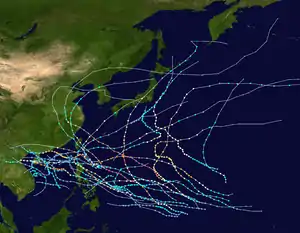 Season summary map | |
| Seasonal boundaries | |
| First system formed | February 18, 1953 |
| Last system dissipated | December 22, 1953 |
| Strongest storm | |
| Name | Nina |
| • Maximum winds | 295 km/h (185 mph) (1-minute sustained) |
| • Lowest pressure | 885 hPa (mbar) |
| Seasonal statistics | |
| Total storms | 24 |
| Typhoons | 17 |
| Super typhoons | 5 (unofficial) |
| Total fatalities | 430 |
| Total damage | Unknown |
| Related articles | |
The scope of this article is limited to the Pacific Ocean, north of the equator and west of the international date line. Storms that form east of the date line and north of the equator are called hurricanes; see 1953 Pacific hurricane season. Tropical Storms formed in the entire west Pacific basin were assigned a name by the Fleet Weather Center on Guam.
Systems
Typhoon Irma
| Category 3 typhoon (SSHWS) | |
 | |
| Duration | February 18 – February 25 |
|---|---|
| Peak intensity | 185 km/h (115 mph) (1-min) 980 hPa (mbar) |
Typhoon Judy
| Category 4 typhoon (SSHWS) | |
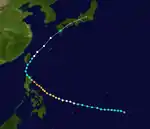 | |
| Duration | May 28 – June 7 |
|---|---|
| Peak intensity | 220 km/h (140 mph) (1-min) 940 hPa (mbar) |
Typhoon Judy struck the Southern Japanese island of Kyūshū. 37 people were killed and 15 were missing.[1]
Tropical Storm 04W
| Tropical storm (SSHWS) | |
 | |
| Duration | June 24 – June 26 |
|---|---|
| Peak intensity | 75 km/h (45 mph) (1-min) 1000 hPa (mbar) |
Super Typhoon Kit
| Category 5 super typhoon (SSHWS) | |
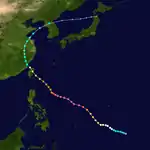 | |
| Duration | June 25 – July 8 |
|---|---|
| Peak intensity | 280 km/h (175 mph) (1-min) 910 hPa (mbar) |
Typhoon Lola
| Category 1 typhoon (SSHWS) | |
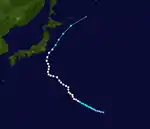 | |
| Duration | July 23 – August 3 |
|---|---|
| Peak intensity | 150 km/h (90 mph) (1-min) 970 hPa (mbar) |
Typhoon Mamie
| Category 3 typhoon (SSHWS) | |
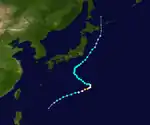 | |
| Duration | July 30 – August 8 |
|---|---|
| Peak intensity | 185 km/h (115 mph) (1-min) 980 hPa (mbar) |
Super Typhoon Nina
| Category 5 super typhoon (SSHWS) | |
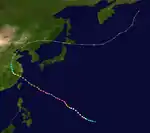 | |
| Duration | August 8 – August 18 |
|---|---|
| Peak intensity | 295 km/h (185 mph) (1-min) 885 hPa (mbar) |
Nina was a major storm. It made landfall in China as a Category 4 tropical cyclone.
Tropical Storm 09W
| Tropical storm (SSHWS) | |
 | |
| Duration | August 9 – August 11 |
|---|---|
| Peak intensity | 85 km/h (50 mph) (1-min) |
Typhoon Ophelia
| Category 3 typhoon (SSHWS) | |
 | |
| Duration | August 12 – August 16 |
|---|---|
| Peak intensity | 185 km/h (115 mph) (1-min) 960 hPa (mbar) |
Typhoon Phyllis
| Category 1 typhoon (SSHWS) | |
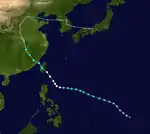 | |
| Duration | August 15 – August 22 |
|---|---|
| Peak intensity | 140 km/h (85 mph) (1-min) 975 hPa (mbar) |
Typhoon Rita
| Category 4 typhoon (SSHWS) | |
 | |
| Duration | August 23 – September 2 |
|---|---|
| Peak intensity | 230 km/h (145 mph) (1-min) 940 hPa (mbar) |
Tropical Storm 13W
| Tropical storm (SSHWS) | |
 | |
| Duration | August 26 – August 29 |
|---|---|
| Peak intensity | 100 km/h (65 mph) (1-min) 995 hPa (mbar) |
Typhoon Susan
| Category 3 typhoon (SSHWS) | |
 | |
| Duration | September 15 – September 20 |
|---|---|
| Peak intensity | 205 km/h (125 mph) (1-min) 970 hPa (mbar) |
Super Typhoon Tess
| Category 5 super typhoon (SSHWS) | |
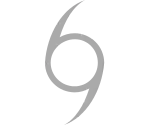 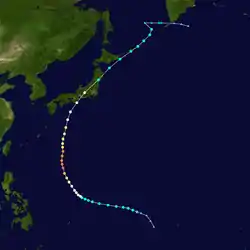 | |
| Duration | September 17 – September 27 |
|---|---|
| Peak intensity | 280 km/h (175 mph) (1-min) 900 hPa (mbar) |
Typhoon Tess struck the Central Honshū Island in Japan. 393 people were killed and 85 were missing.[3]
Tropical Storm 16W
| Tropical storm (SSHWS) | |
 | |
| Duration | September 25 – September 28 |
|---|---|
| Peak intensity | 75 km/h (45 mph) (1-min) 1000 hPa (mbar) |
JMA Tropical Storm 15
| Tropical storm (JMA) | |
 | |
| Duration | October 1 – October 3 |
|---|---|
| Peak intensity | Winds not specified 999 hPa (mbar) |
Typhoon Viola
| Category 3 typhoon (SSHWS) | |
 | |
| Duration | October 3 – October 8 |
|---|---|
| Peak intensity | 185 km/h (115 mph) (1-min) 965 hPa (mbar) |
Typhoon Winnie
| Category 1 typhoon (SSHWS) | |
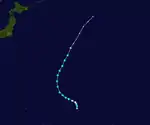 | |
| Duration | October 6 – October 9 |
|---|---|
| Peak intensity | 120 km/h (75 mph) (1-min) 990 hPa (mbar) |
Typhoon Alice
| Category 3 typhoon (SSHWS) | |
 | |
| Duration | October 11 – October 23 |
|---|---|
| Peak intensity | 185 km/h (115 mph) (1-min) 915 hPa (mbar) |
Super Typhoon Betty
| Category 4 super typhoon (SSHWS) | |
 | |
| Duration | October 25 – November 2 |
|---|---|
| Peak intensity | 240 km/h (150 mph) (1-min) 965 hPa (mbar) |
Typhoon Cora
| Category 4 typhoon (SSHWS) | |
 | |
| Duration | November 8 – November 20 |
|---|---|
| Peak intensity | 220 km/h (140 mph) (1-min) 960 hPa (mbar) |
Tropical Storm 22W
| Tropical storm (SSHWS) | |
 | |
| Duration | November 25 – November 29 |
|---|---|
| Peak intensity | 75 km/h (45 mph) (1-min) 1000 hPa (mbar) |
Tropical Storm 23W
| Tropical storm (SSHWS) | |
 | |
| Duration | November 28 – December 3 |
|---|---|
| Peak intensity | 75 km/h (45 mph) (1-min) 1000 hPa (mbar) |
Super Typhoon Doris
| Category 5 super typhoon (SSHWS) | |
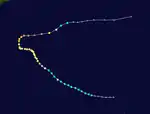 | |
| Duration | December 9 – December 22 |
|---|---|
| Peak intensity | 280 km/h (175 mph) (1-min) 935 hPa (mbar) |
A rare late-season Super Typhoon. Did not affect land.
The Lost Hurricane Hunters 3: December 15, 1953
The third typhoon hunter mission lost occurred on December 16, 1953, during a penetration by a Navy PB4Y-2S (Bu No 59176) into Typhoon Doris. The aircraft was part of a six plane squadron, VJ-1/VW-3, COMFAIRGUAM, based at the Naval Air Station in Agana, Guam (VJ-1 was formed in 1952 at NAS Sand Point, Seattle, Washington, and the name later changed to VW-3). The PB4Y-2S aircraft made its initial penetration into Doris' eye at 200–300 feet. As the aircraft radioed back a report at 2245Z, the transmission suddenly ceased. The plane was never heard from again. At the time, Doris was a Category 2 typhoon with sustained winds of 95 knots (110 mph). Again, given the low penetration altitude of the aircraft, it is likely that a downdraft carried the plane into the sea. It's pretty common to get downdrafts that will cause a 300-foot loss of altitude, despite the attempts of the pilot to climb with full power to the engines.
A nine-day long search and rescue operation failed to find any trace of the missing aircraft. Tragically, two aircraft involved in the search and rescue mission crashed, killing 39 more people. The first of these planes was a R4D (DC 3) that crashed into the crater of Agrihan Island, Mariannas, killing all ten crew members. This aircraft was not from the NAS Agana, Guam group. In addition, a B-29 based at Anderson AFB had an engine fail while looking for the missing typhoon hunter aircraft, and crashed during landing into an officer's housing area on Guam. A total of 29 people died in the crash, including at least 11 of the 16 crew members on the aircraft.
The nine crewmen lost during the flight into Typhoon Doris were:
Pilot J. W. Newhall age 39
Co-pilot S. B. Marsden, age 29
Lt. Cmdr. D. Zimmerman Jr., age 35
Ltjg. F. Troescher Jr., age 26
AL1 F. R. Barnett, age 26
AD1 J. N. Clark, age 32
AD3 E. L. Myer, age 20
AL2 N. J. Stephens, age 23
AO3 A. J. Stott, age 23
Storm names
|
See also
- 1953 Pacific hurricane season
- 1953 Atlantic hurricane season
- Pre-1980 North Indian Ocean cyclone seasons
- Pre-1970 Southern Hemisphere tropical cyclones
References
- Digital Typhoon: Disaster Information
- "Significant storm surge events in Hong Kong before 1953". www.hko.gov.hk. Retrieved 2020-08-11.
- "Digital Typhoon: Typhoon 195313 (TESS) - Disaster Information". agora.ex.nii.ac.jp. Retrieved 2020-08-30.